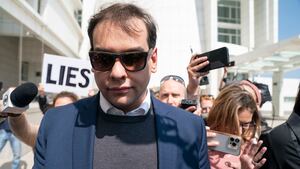On Tuesday, Justice Department prosecutors brought new charges against Rep. George Santos (R-NY), bringing the total counts from 13 to 23 and introducing the first alleged financial crimes involving his campaign.
But while the superseding indictment lays out a number of brazen fraudulent schemes—stealing financial information from donors and family members, making an array of unauthorized political contributions, and pocketing some of the money personally—prosecutors made clear that they have not disclosed the full breadth of their knowledge of Santos’ alleged political crime spree.
For instance, the indictment says that prosecutors know of multiple instances in which Santos appears to have used other people’s personal and financial information to make a number of what would be illegal political contributions in his name and the names of others. (At one point, the indictment says, Santos used a contributor’s credit card information to pay himself directly.) However, Santos is only charged in connection with one of those events. Additionally, Santos is under investigation for other alleged wrongdoing that hasn’t appeared in the first or superseding indictment, including an inquiry into the details surrounding his previous marriage to a Brazilian woman.
Brendan Fischer, a campaign finance law expert and deputy executive director at Documented, told The Daily Beast that while the charges reveal Santos “engaged in a ridiculous criminal scheme,” the indictment still does not tell the full story.
“There’s still a lot that we don’t know, and there are many indications that DOJ has way more evidence up its sleeve,” Fischer said.
There is one particularly glaring omission in the new federal complaint: the source of the hundreds of thousands of dollars in shady personal loans that Santos claims to have made to his own campaign.
Santos faked one $500,000 loan entirely, prosecutors said. But The Daily Beast previously reported that the money was, eventually, real—hitting the campaign’s account months later in a series of alleged loans totalling $630,000, backfilling the $500,000 vacuum in the campaign’s record books and keeping it solvent throughout the last weeks of the contest.
Those loans are the largest financial transactions Santos is known to have conducted—dwarfing the amounts involved in his other alleged fraud. And while legal experts have for months put their finger on those mysterious loans as likely the biggest and most urgent potential financial crime at play, prosecutors have not explained where the money came from or who was involved.
The Daily Beast, however, can reveal a key part of that mystery. According to a person with knowledge of events, the $630,000 in campaign loans currently on the books was transferred electronically to the campaign from an account under the name of Santos’ own private company, the Devolder Organization.
Joe Murray, Santos’ attorney, did not respond to The Daily Beast’s comment request.
Legal experts tell The Daily Beast that this means Santos appears to have violated the law against corporate contributions. They said that the loans raise serious legal and ethical questions about the origins and intentions behind that money—such as whether Santos was hiding the names of unsavory financial backers or trying to find a way around fundraising limits on individual campaign donors.
Saurav Ghosh, director of federal reform at the Campaign Legal Center, called the arrangement a “sham all the way through.”
“As we sort of knew all along, the cash behind his candidacy was basically money from others washed through a paper-thin ‘business’ set up right as he was running for Congress,” Ghosh told The Daily Beast.
“That would be bad enough, before you add in the garden-variety theft and fraud,” he added.
Jordan Libowitz, communications director for Citizens for Responsibility and Ethics in Washington, observed that there are “many, many, many, potentially criminal explanations.”
“It’s a web of deceit and confusion, with so many question marks—where the money came from, what it was intended for, how he got it, where it went,” Libowitz told The Daily Beast. “That’s the entire point behind FEC disclosures—so that the public knows where campaign money comes from, and if it’s legal. We are 0 for 2 here.”
The indictment charges Santos for making a fake $500,000 loan to his campaign in March 2022, in order to qualify for benefits from a National Republican Congressional Committee candidate aide program. According to prosecutors, the loan was not backed with real money, and Santos only had $8,000 to his name. Still, the loan appeared in reports that the campaign filed with the Federal Election Commission, earning Santos a charge for filing a false statement to the government.
“Devolder Santos did not provide the Committee with a check for the purported $500,000 loan, nor did he wire transfer such funds at that time,” the indictment says. “Moreover, at that time, Devolder Santos did not have the funds to cover such a loan. In truth, Devolder Santos had less than $8,000 in his personal and business bank accounts.”
The key phrase, however, is “at that time.”
Hours before the grand jury handed down the indictment, The Daily Beast reported that while the $500,000 was fake in March, those funds did make their way to the campaign. But according to a person with knowledge of the events, the money did come through, from Santos’ company. These facts are in line with the indictment’s specific claim that Santos did not “wire transfer such funds at that time.”
Previously, including in conversations with The Daily Beast, Santos has acknowledged that the loans originated from Devolder Organization funds. However, his version of the story implied that the money merely came out of the paychecks he received in the typical course of business, like any other self-funding candidate who owns a business and uses some of the income to fund their campaign. That is not what happened.
For instance, in December, Santos told New York radio and podcast host John Catsimatidis that the loans came from “the money I paid myself through the Devolder Organization.”
Even if this were true, Santos would still have trouble explaining such an acute and astronomical injection of personal cash right around the election. But, as with so many of Santos’ claims, this one now appears totally false.
Instead, according to the source, the funds were transferred to the campaign directly from the Devolder Organization’s account. Santos, whose name did not appear anywhere on the payments, the source told The Daily Beast, did not pay it to himself first.

U.S. Representative George Santos (R-NY) faces reporters as House Republicans met behind closed doors in an attempt to reach agreement on selecting a nominee for Speaker on Capitol Hill on October 11.
Leah Millis/ReutersHis 2022 candidate financial disclosure lists a $750,000 salary from the Devolder Organization, an increase of nearly $700,000 over his previous disclosure and nearly dollar for dollar the amount he claimed to have loaned his campaign. He filed the disclosure on Sept. 6, four days before making a $300,000 campaign loan. (Santos is also charged with making false statements about his salary; and the campaign’s loan total mysteriously changed in subsequent filings.)
But prosecutors go to lengths to show that Santos did not have anywhere near that amount of money in March 2022: only $8,000 in personal and business accounts combined. Six months later, Santos was apparently so wealthy that he could loan his political operation hundreds of thousands of dollars, with no due date. (At the time, his sister was being evicted from her rent-controlled apartment, where Santos also holed up at one point.)
And in a separate press statement accompanying the indictment, prosecutors actually refer to multiple fake loans, writing, “These false reported loans included a $500,000 loan, when Santos had less than $8,000 in his personal and business bank accounts.” The DOJ statement does not clarify which of Santos’ reported loans were fake, and does not say whether some of the loans eventually came through. (Santos made his first large loan about six weeks after he created the Devolder Organization—$80,000 on June 30, 2021.)
“If the Devolder Organization is incorporated, then it’s prohibited from providing money to Santos’ campaign,” Ghosh explained. “Corporations cannot make contributions to campaigns and any transfer of money—be that a loan or an advance—is considered a contribution.”
Prosecutors describe the Devolder Organization not as a sole proprietorship, but a limited liability company with Santos as “sole beneficial owner.” Still, Ghosh observed that “even in the event that the company was some sort of unincorporated entity, it’s important to note that even in that case we’re still looking at a contribution in the name of another.”
Interestingly, the Devolder Organization was dissolved by the state of Florida on Sept. 20, 2022, for failure to file its annual report. Santos made a $100,000 loan that day, according to his latest FEC filing, and loaned another $300,000 ten days earlier. He made three more six-figure loans while the company was dissolved, the filing shows.
Ghosh told The Daily Beast that the involuntary administrative dissolution likely wouldn’t be a blessing in disguise for Santos, even with the later loans, as the law “would still view that as the corporation’s assets being distributed.” And because Santos also reinstated the company months later, that shows “it wasn’t dissolved in any real sense,” Ghosh said.
Legal experts say that while the details are thin, there appear to be two possible explanations—both could possibly be true at the same time, and neither of them are legal.
In the first scenario, Santos would have used his company as a conduit to raise money from secret contributors directly into his campaign, getting mountains of quick cash from wealthy donors who would otherwise have been subject to the federal $5,800 limit. This, experts said, would be making an illegal “straw donation”—a contribution in the name of another—and, if the donors were aware and complicit, it could result in legal exposure for them as well.
The second scenario envisions Santos transferring the proceeds earned from legitimate Devolder Organization business transactions—such as brokering a yacht between two business clients, as The New York Times reported Santos did right around the time he was making these loans. That fact pattern, experts said, would be putting corporate funds into a campaign—a point underscored by the claim that those funds came straight from the Devolder Organization’s bank account.
In April of this year, Santos told an anonymous Twitter user—whose identity is known to The Daily Beast—that he had effected another business deal for a client previously identified by The Daily Beast.
In that deal, Santos connected two donors, both in the insurance industry, resulting in one of them selling their business to the other. The Daily Beast confirmed through a person with direct knowledge of the matter that the sale formally closed on or around Nov. 1—just before the election—though the talks had been in the works for many months. It is not clear when Santos took his commission, or whether he was given an advance. A second person with knowledge of the sale told The Daily Beast that federal investigators had inquired about the sale and left the interview with the stated understanding that it had been a legitimate deal.
Fischer, of Documented, told The Daily Beast that while some clients may have a legitimate explanation, Santos does not.
“If Santos financed the loans from ‘clients’ who sought to secretly support his Congressional run, then those donors would have made illegal, undisclosed contributions to his campaign,” Fischer said. Even if Santos provided legitimate services, he added, those clients still would have broken the law if they gave the candidate’s commission a special boost above market value.
“But assuming that Santos had some customers who paid his business for legitimate purposes, a candidate cannot treat their corporate bank account as a personal piggy bank,” Fischer said. “Santos could still have violated campaign finance law if he treated corporate money as his personal funds.”
Santos was scrambling for political funds right around this time. For instance, he’s also accused of soliciting and accepting donations to a fake political nonprofit that he also described as a super PAC—but was in reality a private company—fraudulently inducing donors to fork over tens of thousands of dollars in September and October. Santos then used some of that money on personal expenses, including designer clothes, prosecutors said.
That company, which The Daily Beast and other outlets have identified as Redstone Strategies, listed the Devolder Organization as a member.
Prosecutors also said in the indictment that Santos had committed more campaign finance and fraud crimes than they charged explicitly. This is notable because some of the allegations are described as straw donations, which could carry implications not just for Santos, but possibly also for any donors complicit in such a scheme.
In a scheme where Santos allegedly obtained and used credit card information of other people to make donations, the indictment says that Santos repeated this act with a number of victims—“oftentimes concealing the true source of the funds by misappropriating the personal identity information of relatives and associates of Devolder Santos without their authorization.” And the charges state that Santos acted “together with others” in these efforts.
Prosecutors lay out one straw scheme in particular, involving an individual identified as “Contributor #12,” who on Dec. 14 gave Santos information from two credit cards to make a donation. Santos then used that card three days later to make illegal donations in the name of a family member, whom The Daily Beast has identified from information in the indictment and in FEC data as his sister, Tiffany.
Contributor #12 appears from the indictment to have been fine with the fact that Santos used their cards to make a donation in the name of another person, and only “did not know of or authorize charges exceeding [contribution] limits.”
While the feds only charge Santos in connection to this one explicit scheme, they allege that he committed this same fraud with many people.
“In addition to Contributor #12, Devolder Santos used the credit card billing information of other individuals to contribute to the Committee and to the campaigns of other candidates for elected office, all without the knowledge or authorization of the individual cardholders,” the indictment says. Santos then allegedly repeatedly tried to obscure the true source of the funds and skirt the federal contribution limits, “by using the names of other unwitting individuals, including individuals who had previously contributed to his campaign and his own relatives, among others.”








